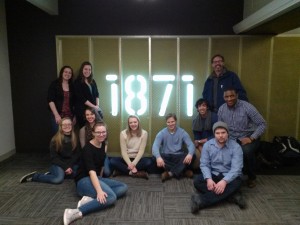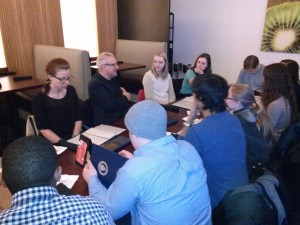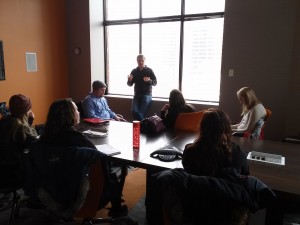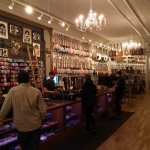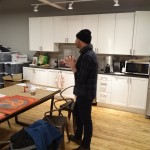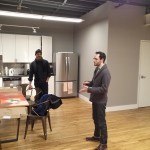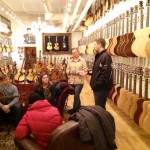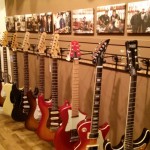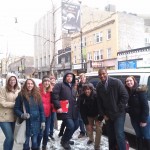Yesterday (February 20, 2015), the class ventured to Chicago to take a look at what’s happening in the start-up scene there. In comparison to Detroit, the differences were clear even as we were just driving into the city. Already, the buildings looked a little more well kept, there was much more traffic, and more people were walking around, on their way to work or just visiting the city.
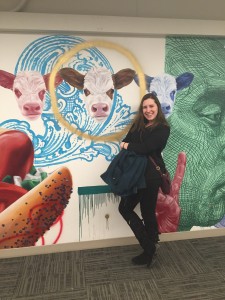
We started out in the heart of downtown, visiting both 1871 and Matter in the same building, the Merchandise Mart Plaza. In 1871, we were guided through the space by Diana Lopez-Obaldo, Director of External Affairs and International Relations. She told us about much of what 1871 has to offer to members, including four different levels of membership, 24/7 access to the space for members, co-work spaces, offices, conference rooms, classrooms, an auditorium, mentors, and workshops and events. 1871 is all about working for a better Chicago through the creation of new business and innovation, especially with technology. To achieve this, 1871 offers a competitive environment to work in, as well as a space to collaborate with other entrepreneurs and business people. Much like the spaces we visited in Detroit, 1871 was aimed at giving entrepreneurs a space to work where they could also find the resources they needed to grow.
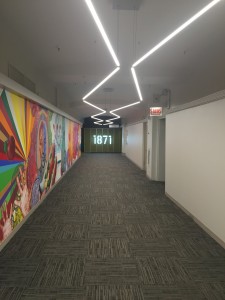
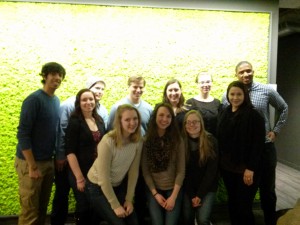
After 1871, we went just down the hall to Matter, a brand new space for entrepreneurs to work on projects specifically related to innovation in the field of healthcare. Matter is positioned perfectly in Chicago because there are so many healthcare facilities in the area. We were led by Mindi Knebel, Director of Operations, through Matter’s space, which hadn’t even been completely finished yet. After a tour, we were able to ask questions and learn more about the company. One of my big questions was how it worked to be a start-up in the business of helping and building other start-ups. Mindi explained that that was one of the most difficult parts of the job; acting like you know exactly what you’re doing with start-ups while still trying to figure it out for yourself. However, she explained that Matter is being built by people with experience in start-ups already, including a few people who were heavily involved in opening 1871 just a few years earlier. Already, Matter is home to some of the businesses that will make and are already making leaps and bounds in the healthcare world.
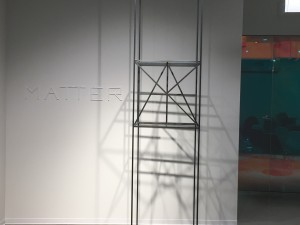
After Matter, we went just downstairs to meet up with Paul Magelli Jr. for lunch at Nick’s Fish Market. Magelli has had success in building a tech start-up in the past (Apertio – acquired by Nokia-Siemens in 2008 for Eu140M) and is currently working on another project, Apervita, where he talked about recently raising $18 million in venture capital. Magelli had a lot to say about the start-up world as a whole, providing his insights from a perspective of success. He told us that the world is open to us now in this day and age, especially with the leaps in technology with the internet and inventions such as Skype, stating, “We live in a networking world.” Paul also questioned our knowledge, asking us questions about entrepreneurship and whether it should be serial or searching, what it means to pivot, and talking about the idea of “seeds and needs”. All three things seem to fit well together, an entrepreneur should always be searching for their place in a market, just like the concept of having an idea, a “seed,” and then fitting it into a “need”. While looking at “seeds and needs” an entrepreneur should also have the ability to pivot, or change their path quickly when needed to survive. Overall, Paul’s vast experience gave him many great insights into our beginning entrepreneurship class.
Next, we walked right down the street to talk with Moses Hohman of Human Practice. Moses talked a lot about starting a company while also having a family and where values come into play with a start-up. One of the most interesting and insightful stories that we heard in Chicago came from Moses. He told us his story of how he ended up where he is now, citing a moment in his life that made a huge impact. Moses was in college when a man he didn’t know asked him what his questions were about physics and he could only say that he found it interesting and didn’t have any questions about the subject. Hearing this, the man told Moses that maybe he was in the wrong field. Though Moses never saw the man again, he said he was grateful for the insight, and wished that he had had a mentor like him in his life. After deciding a career in physics wouldn’t really work out, Moses pursued his interest in start-ups and is now working on his own, Human Practice. So, one of the most important things that I took away from our discussion with Moses was to find the right mentor for you, someone who understands you and can tell you things that may not be so clear to yourself.
Moses also spoke about being a start-up in it’s own environment, unattached to an incubator, accelerator, or even a co-working space. He said to embrace the vulnerability of the situation and learn from it. He said to not put up a front that everything is perfect, be aware of the faults and weaknesses and learn from them, a different way to look at things than what we’ve been hearing so far. I liked this perspective, taking away that even if not everything is perfect, you can’t just cover it up because that can make the situation much worse than if you just acknowledge and address the problems in the first place. Moses closed by saying that every start-up goes through hard times, but you have to keep your passion to be successful, though success is not what it’s all about, “It’s not about the destination; it’s about the journey.”
For our final stop, we visited Chicago Music Exchange, a large guitar store owned by David Kalt. There, we met up with Western alumni, Jake Gasaway, a co-founder of Stitch Labs and WMU alum. He spoke of his story of working for larger companies before moving on to creating his own. He said that working for a larger company taught him how companies should look to be successful, as well as other skills that were transferable to starting his own business. He shared that as good as working for a large company was, working in a start-up business has it’s benefits too, such as having the passion to work harder and longer as well as being able to make an impact on the company, something that is much harder to do in a large company. After meeting with Jake, we walked across the street with him to David Kalt’s start-up, Reverb. There we spoke to both David and Jake about their tech start-ups. From this conversation, I took away that location was very important to them both because of family. Location also played a role in David’s goals because he felt that Chicago was creating real and sustainable businesses that people are actually interested in. David said that was very important to him, because in places such as the Silicon Valley, he felt that the start-ups there were created for the people there, by the people there. To David, creating something that anyone could use was much more important.
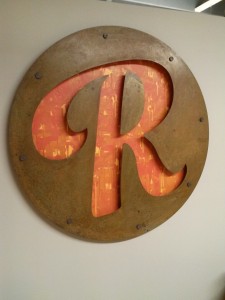
Overall, in comparison to Detroit, Chicago was a much more mature start-up community. They had a lot of support from multiple levels of government as well as prominent individuals in the community. There was also much more going on through the medical field that was not seen in Detroit. Chicago has been building it’s start-up community ever since the Chicago Fire in 1871, while Detroit is just starting out after declaring bankruptcy just two years ago. The maturity levels of these two communities plays a huge part in how the start-up communities operate, making me excited to learn more about Austin and Boulder’s start-ups are like in the next few weeks as they are also completely different from all of the other cities we are looking at.

